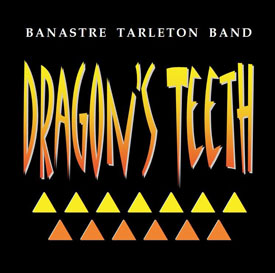 |
|

Jeremy Morris, Jam Records |
| “Banastre Tarleton is certainly a one of a kind artist, and it’s especially evident on his latest offering DRAGON’S TEETH. He comes from the old school of songwriting and performing which translates to music with meaning and music with a message. It comes straight from the heart. This is music that is made the way it should be. He is a sonic breath of fresh air in a vast digital audio wasteland. A true cousin to some of the great ones...like a rock and roll Bob Dylan and Pete Seeger combined. He is a one of kind artist with a vast musical legacy just waiting to be discovered by a wider audience.” |
Aarik Danielsen, The Columbia Daily Tribune |
Unlike "The Incredible Hulk's" alter-ego, there's a good chance you'll like Banastre Tarleton when he gets angry. A fixture on the local music scene, the singer-songwriter is known for penning eclectic, upbeat jams shaped and styled by decades' worth of influences ranging from British Invasion bands to '70s rockers and New Wave pioneers. Tarleton is so flexible and fluent musically, in fact, that he often tours a set that acts as a rock-history revue.Top of Form 4 But, on the Banastre Tarleton Band's latest EP, "Dragon's Teeth," he steps away from the sunnyside-up nature of past material and dives headlong into the brambles and burrs of the socio-political thicket. Among those fixed in his sights — and sounds — are oppressors, one-percenters, Hezbollah bombers and the "civilized" nations who would condemn such terrorists while sweeping their own spotty track records under the global rug. Tarleton gets personal before he gets political, though, kicking off the record with "Mother Teresa's Spirit in the Present," an atypical love song; over a classic-rock groove, Tarleton praises his wife's ability to bring light and healing into his world. Elsewhere, "The Warmongers from Hell" borrows a lyric Tarleton wrote in 1975 and brings it into the present. The music, he noted, is a nod to one of his favorite bands, British rock act The Cult. The tune boasts big, crisp 1980s drums and a gliding, piano-laden groove that's part "All Along the Watchtower," part Tom Petty. One of Tarleton's regular collaborators, Randy Beeman, plays a ringing solo that qualifies as some of the best old-school lead guitar you'll hear on a local project. Beeman also brings a strong, melodic presence to album closer "Brutal," which closes a rather sober project on an optimistic note. At other points along the way, Tarleton dabbles in a vintage Euro-pop feel and, on the instrumental "Square Bashing," a sound that's part magisterial chamber-rock, part synth-pop. By design, much of the project has a fuzzy, decidedly unpretty patina. Tarleton recorded four of the six cuts at home on what he termed "a cheap cassette player," before modernizing them in a proper studio. The piano riff on "Square Bashing" was captured on an iPhone. Both the techniques and themes represented here require bravery — you might not come away agreeing with Tarleton's politics or artistic choices, but you have to give the guy a hand for doing it his way. While the unpolished feel fits the EP's mood, there's a definite dissonance between the subjects Tarleton tackles and the catchiness of his songs. No doubt that, too, is intentional. On one hand, Tarleton seemingly can't write without landing on these classic-rock touchstones. However, he has a way of causing the listener to hum or sing along long before they've realized exactly what they're singing along to. In this way, he prompts thoughts about the political overtones and undercurrents within the material without having to argue his case.” |